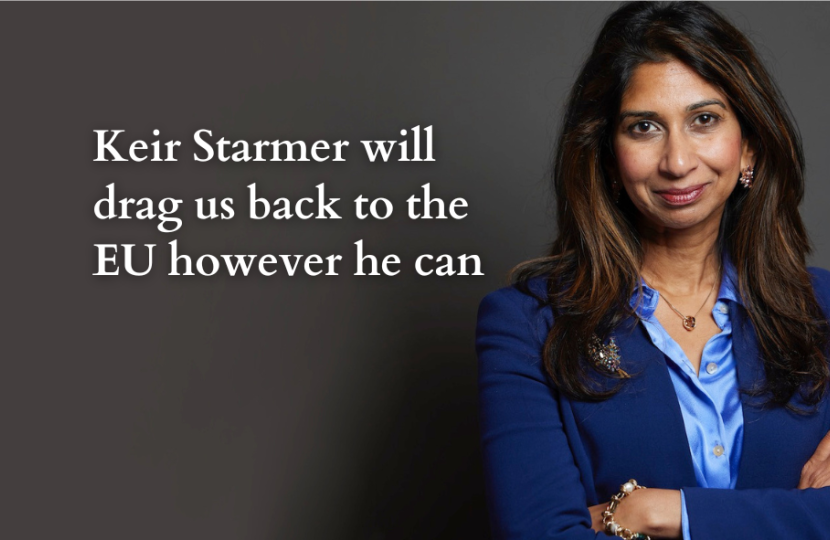
The Telegraph, 7th February 2025
Keir Starmer will drag us back to the EU however he can
While Britain has formally left the EU, we are still far from realising the full benefits of Brexit. Our PM is making sure we never will
“Brexit was catastrophic for the UK, for our communities and for the next generation,” wrote Keir Starmer in 2016. So unshakable was his conviction that he resigned from Jeremy Corbyn’s Shadow Cabinet over it, campaigned tirelessly for a second referendum, and voted at every opportunity to thwart the Conservative government’s attempts to deliver Brexit.
Now, installed in Downing Street, he is poised to ignore the will of the people and undo Brexit by stealth.
Starmer, of course, will say all the right Brexity things like “immigration is too high”, “We won’t join the Customs Union”, and so on. He knows that the British people, having suffered the indignity of being dismissed as xenophobes and little Englanders for daring to vote for independence, are not easily fooled. But Starmer has never been one to let principle get in the way of power. His long game is clear: Brexit must be diluted, dismantled, and ultimately destroyed, all while keeping up a facade of pragmatism.
The EU has form when it comes to disregarding inconvenient democratic outcomes. The French and the Dutch overwhelmingly rejected the EU Constitution in 2005, only for it to be repackaged and forced through under the Lisbon Treaty. The Irish were made to vote again in 2009 after initially rejecting both the Nice and Lisbon Treaties.
In 2015, the Greeks voted by 61 per cent to reject EU-imposed austerity measures, yet the bureaucrats in Brussels crushed them into submission regardless. Imagine Tusk and Barnier’s delight if, in 2026, a decade after our “divorce”, we end up renewing vows. The pattern is clear: in the eyes of the EU, democracy is only valid when it delivers the “correct” result and with Starmer in charge, they have a willing accomplice.
Now, Starmer is cosying up to Brussels once again. As he attends the EU Council Leaders’ Summit at the Palais d’Egmont—the very building where Ted Heath signed away our sovereignty in 1972 – the symbolism could not be more ominous. He speaks of “Defence Co-operation”, but we know what that really means: deeper entanglement with the EU’s Common Foreign and Security Policy, a slow creep towards subjugation under Brussels’ decision-making.
The damage Starmer could do is immense. Talk of a new UK-EU Security and Defence arrangement might sound innocuous, even beneficial, but it is anything but. NATO already provides the security architecture necessary to safeguard the UK and its allies. Post-Brexit, Britain has strengthened its defence partnerships with AUKUS (the nuclear submarine agreement with the US and Australia) and GCAP (the next-generation fighter jet programme with Japan and Italy). These are real, substantive alliances that reinforce British sovereignty.
By contrast, deeper integration with EU security structures would do nothing but entangle Britain in the bloc’s bureaucratic and ineffectual defence mechanisms, diluting our ability to act independently.
Regulatory alignment is another looming threat. The Product Regulation and Metrology Bill, now before Parliament, will open the door to the UK once again shackling itself to EU rules on product standards, environmental policies, and consumer regulations. Rachel Reeves has already floated the idea of “dynamic alignment”, which would mean Britain slavishly following Brussels’ regulations without a seat at the table. This would render Brexit meaningless, stripping us of the ability to shape our own economic destiny. Worse still, it would torpedo any prospect of a UK-US trade deal, one of the great prizes of Brexit.
The failure of the Conservatives to properly repeal EU laws and prevent backsliding has already been a missed opportunity; Starmer’s government could seal Brexit’s fate.
And then there is migration. Despite the Labour Party’s new rhetoric on border control, history tells us where their real loyalties lie. The idea of a UK-EU “Returns Deal” is being discussed, allowing Britain to send some asylum seekers back to Europe. But the price will be steep: an acceptance of free movement of workers, taking in an EU-imposed quota of asylum seekers, or granting Brussels further access to British fishing waters.
None of this would be acceptable to the British public. Yet, given Labour’s past enthusiasm for mass migration, can anyone truly believe Starmer’s tough talk will translate into action?
The reality is that while Britain has formally left the EU, we are still far from realising the full benefits of Brexit. Thousands of EU-derived regulations continue to stifle British business. The City is warning that without further deregulation, banks will relocate operations to the US. Legal migration remains at unsustainable levels. Northern Ireland is still partially within the EU’s regulatory orbit, making a UK-US free trade agreement almost impossible.
The job is not finished. The foundations of Brexit have been laid, but the structure remains incomplete.
Starmer may present himself as a pragmatist, but he is an ideologue at heart. He believes in EU supremacy, in international courts overruling British sovereignty, in rule by bureaucrats rather than by the people. If the past decade has shown us anything, it is that Brexit is an ongoing battle, not a settled matter. If Starmer gets his way, the last nine years will have been for nothing. So we must beware the Brexit Reset, beware the reversal of democracy and beware the betrayal of the 17.4 million who voted to leave.
The fight for a truly sovereign Britain must continue.

